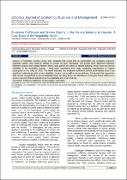| dc.contributor.author | Muheebwa, Florence Prescah | |
| dc.contributor.author | Mbabazi, Mary Grace | |
| dc.contributor.author | Rubalema, Alex | |
| dc.date.accessioned | 2023-12-12T16:28:05Z | |
| dc.date.available | 2023-12-12T16:28:05Z | |
| dc.date.issued | 2019-05-30 | |
| dc.identifier.issn | 2348-5302 (Online) | |
| dc.identifier.issn | 2348-8875 (Print) | |
| dc.identifier.other | DOI: 10.21276/sjebm.2019.6.5.1 | |
| dc.identifier.uri | http://ir.umu.ac.ug/xmlui/handle/20.500.12280/3061 | |
| dc.description.abstract | Success in hospitality business arises from strategies that ensure that an organization has necessary resources,
especially people, who could be utilized to achieve its goals effectively. The current study addressed employee
fulfilment toward work-related factors, which could present the effect to service delivery, service cost and service
reliability in the hospitality industry. Sixty-seven respondents form eight hospitality organizations in Uganda
participated in the study in 2019. The result indicated that employee fulfilment toward work-related factors had
significant relationships with service reliability, service cost as well as service delivery. It indicated that supervision
style had the strongest link to service reliability while the salary factor was identified as having the lowest influence on
service cost and moderate impact on service reliability and service delivery. | en_US |
| dc.language.iso | en | en_US |
| dc.publisher | SAS Publishers, India | en_US |
| dc.relation.ispartofseries | Scholars Journal of Economics, Business and Management;May, 2019; 6 (5): 281–285 | |
| dc.subject | Employee fulfilment | en_US |
| dc.subject | Service quality | en_US |
| dc.subject | Motivation. | en_US |
| dc.title | Employee fulfilment and service quality in the service industry in Uganda a case study of the Hospitality Sector | en_US |
| dc.type | Article | en_US |


